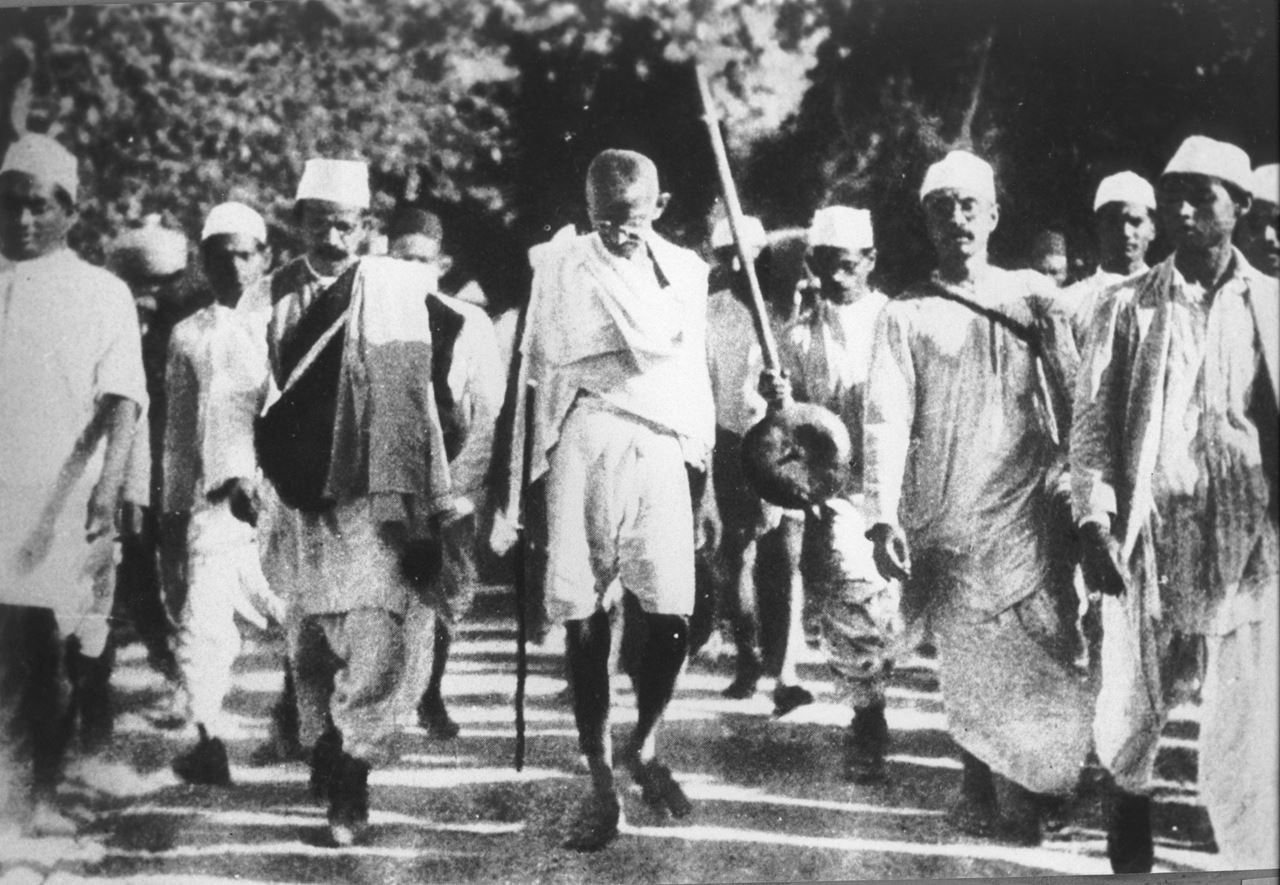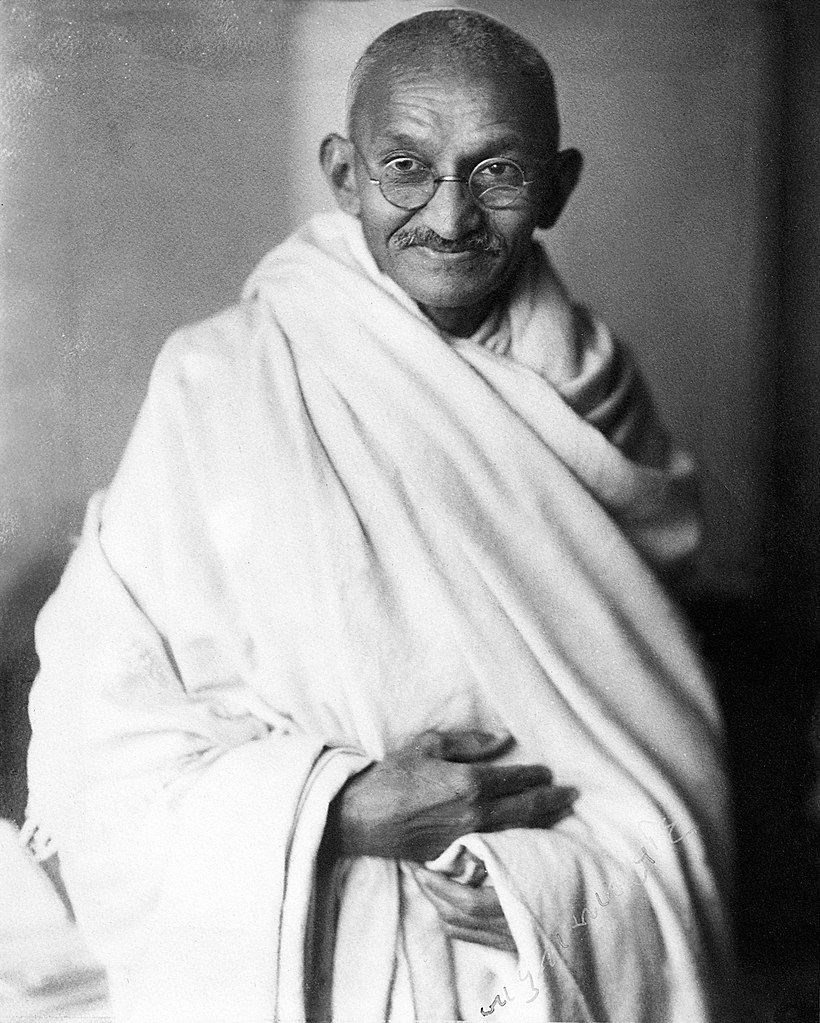India was under British rule for 200 years and gained independence without acting violently.
Mahatma Gandhi brought independence to India by uniting the Indian people and through peaceful strikes. Mohandas Karamchand Gandhi was born in Porbandar, India in 1869. He was an Indian civil rights leader who led his people to freedom from the the British colonial rule. Gandhi’s father was a big politician in his state, making his family part of the upper class. He learned his mother’s religion but rejected it as a young teenager and consumed alcohol and meat. In 1888, he traveled to London to study law at the Inner Temple. Gandhi earned his law degree in 1891. After struggling to find work, he moved to South Africa and lived there for 21 years, returning to India in 1914. A hero must be courageous and execute his plan without any fear. They must also bring good change to their community, a change that will help other people’s lives and how they live. Mahatma Gandhi’s courage of going against the government with a non-violent attitude brought independence and political changes to his country, making him a hero.
 Yann [Public domain]https://commons.wikimedia.org/wiki/File:Marche_sel.jpgMahatma Gandhi was courageous because he went against his government to bring good political change and rights for his people. In March 1930, he started a new campaign against the salt taxes, which affected the poorest Indians. “Gandhi planned a new Satyagraha campaign that entailed a 390-kilometer/240-mile march to the Arabian Sea, where he would collect salt in symbolic defiance of the government monopoly” (Biography.com Editors). Instead of acting violently towards the British, he formed a peaceful march to the Arabian Sea to get salt from the oceans. He walked 240 miles to get salt from the ocean to imbalance the British economic system. Gandhi was courageous for leading a lot of Indians on a long walk to do something he could get arrested for. He was captured with 60,000 other people but received a spot at the round table conference in exchange for the end of the civil disobedience. He convinced the Indian people to stop buying British goods to act as a voice to the government. “Gandhi drew the Indian masses to the INC with his calls for total political and economic independence from the United Kingdom and his support for peaceful methods of protest such as boycotts of British goods. He was imprisoned for these activities in 1922 and served two years in prison" (Gale). Gandhi gained the support of the people to free India from the British rule. He was not going to use violent methods but do it peacefully by protesting and boycotting British goods. He made a move that led to him and many other Indians being sent to jail. He served his time in prison and tried again to protest against the British. He was courageous for going against his government by trying to cause harm to their market through non-violent methods. Although Gandhi was sent to jail many times, he was courageous and kept trying to bring change to his country non-violently.
Yann [Public domain]https://commons.wikimedia.org/wiki/File:Marche_sel.jpgMahatma Gandhi was courageous because he went against his government to bring good political change and rights for his people. In March 1930, he started a new campaign against the salt taxes, which affected the poorest Indians. “Gandhi planned a new Satyagraha campaign that entailed a 390-kilometer/240-mile march to the Arabian Sea, where he would collect salt in symbolic defiance of the government monopoly” (Biography.com Editors). Instead of acting violently towards the British, he formed a peaceful march to the Arabian Sea to get salt from the oceans. He walked 240 miles to get salt from the ocean to imbalance the British economic system. Gandhi was courageous for leading a lot of Indians on a long walk to do something he could get arrested for. He was captured with 60,000 other people but received a spot at the round table conference in exchange for the end of the civil disobedience. He convinced the Indian people to stop buying British goods to act as a voice to the government. “Gandhi drew the Indian masses to the INC with his calls for total political and economic independence from the United Kingdom and his support for peaceful methods of protest such as boycotts of British goods. He was imprisoned for these activities in 1922 and served two years in prison" (Gale). Gandhi gained the support of the people to free India from the British rule. He was not going to use violent methods but do it peacefully by protesting and boycotting British goods. He made a move that led to him and many other Indians being sent to jail. He served his time in prison and tried again to protest against the British. He was courageous for going against his government by trying to cause harm to their market through non-violent methods. Although Gandhi was sent to jail many times, he was courageous and kept trying to bring change to his country non-violently.
A hero is supposed to bring good change for his people, and Gandhi did that by bringing independence and getting rights for many people. While he was in prison, many people protested against the government for his freedom. “The South African government eventually released Gandhi and abolished its Indian taxes” (Gale). His protesting and the support from many Indians gave the authorities no choice but to release him and remove all the taxes for Indians. Gandhi sacrificed himself and went to jail to get better changes for the Indians in South Africa. He and many leaders were sent to jail for the Salt March, where they walked to the Arabian Sea and collected salt from there. This is how Gandhi and many got around from the salt taxes and disturbed the British economy. “Two months later he made an agreement with Lord Irwin to end the Salt Satyagraha in exchange for concessions that included the release of thousands of political prisoners” (Biography.com editors). His protest was so effective that the British agreed to release many Indians in exchange for the end of the strike. Violence is not the only way to win arguments. Gandhi stuck to the purpose of his strike and brought good change for his people, In this case was the reduction of the salt taxes for Indians. For many generations, the exterior caste or the untouchables were looked down upon, until Gandhi gave them respect by fasting. “Because of Gandhi's fast, some temples were opened to exterior castes for the first time in history” (Gale). Before Gandhi made this change, the exterior castes were highly disrespected and looked down upon. Gandhi believed that this was wrong and started a fast until a change was made. Finally, some temples were opened to the exterior castes for the first time because of Gandhi’s influence. Gandhi brought good political and cultural changes for his community, making him no less than a hero or an inspiration for others.
 Elliott & Fry (see [1]) [Public domain]https://upload.wikimedia.org/wikipedia/commons/7/7a/Mahatma-Gandhi%2C_studio%2C_1931.jpgMahatma Gandhi’s courage of going against the government with an non-violent attitude brought independence and political changes to his country, making him a hero. Mahatma Gandhi brought many positive changes to his community, and he inspired many other people like Martin Luther King Jr. He was courageous by following through with his plan when he kept failing and going to prison. He tried not to act violently, but still his voice heard by the government. He led many protests against the government, and that took a lot of courage. He brought many positive changes to his community, such as fighting for independence against the British, getting Indians rights in South Africa, and getting some temples to accept the exterior castes.
Elliott & Fry (see [1]) [Public domain]https://upload.wikimedia.org/wikipedia/commons/7/7a/Mahatma-Gandhi%2C_studio%2C_1931.jpgMahatma Gandhi’s courage of going against the government with an non-violent attitude brought independence and political changes to his country, making him a hero. Mahatma Gandhi brought many positive changes to his community, and he inspired many other people like Martin Luther King Jr. He was courageous by following through with his plan when he kept failing and going to prison. He tried not to act violently, but still his voice heard by the government. He led many protests against the government, and that took a lot of courage. He brought many positive changes to his community, such as fighting for independence against the British, getting Indians rights in South Africa, and getting some temples to accept the exterior castes.
I am inspired by Gandhi because of how he lived his life. He lived his life with a positive attitude and willingness to bring change. “In a gentle way, you can shake the world” (Gandhi). This quote is inspiring to me because it shows how Gandhi brought change for his people without violent methods. He explains how we don't need weapons or violence to get our voice heard. “Live as if you were to die tomorrow. Learn as if you were to live forever” (Gandhi). Gandhi explains that we all should go and learn something new and try new things. It tells us that we aren't going to live forever, so we should try new things and keep learning. “I will not let anyone walk through my mind with their dirty feet” (Gandhi). He teaches us that we should not let anyone influence us in a bad way, and we should stand by what is correct. No matter how convincing the other person is, we should make the ethically correct choices. “Freedom is not worth having if it does not include the freedom to make mistakes” (Gandhi). This quote is inspiring because it encourages me to make mistakes and learn from them. When you have freedom, you can do anything, such as trying something new, but it’s all right to fail and try again. “An eye for an eye only ends up making the whole world blind” (Gandhi). This quote taught me that seeking revenge or acting violently in situations will do nothing but make everyone weak as a people.
India was under a long British rule and gained independence without acting violently. Mahatma Gandhi, without hurting anyone, got his voice heard by the government and influenced political and social changes in his community. He is a hero and an inspiration to many people. All of us should be more like Gandhi; we should act non-violently in situations. We should understand that there is always another way that does not hurt anyone. Gandhi did not do it alone; he had the support of many people. It tells us that if we unite as one, we can accomplish many things. In Gandhi’s case, the accomplishment was the end to a 200-year-old foreign rule.
Works Cited
B.R. Nanda. “Gandhi, Mohandas Karamchand.” Britannica Biographies, Mar. 2012, p. 1. EBSCOhost,
search.ebscohost.com/login.aspx?direct=true&db=b6h&AN=32410654&site=brc-live.
"Gandhi." Gale Student Resources in Context, Gale, 2017. Student Resources In Context,
https://link.galegroup.com/apps/doc/MPBVDY903552274/SUIC?u=powa9245&sid=SUIC&xid=d062
74d. Accessed 29 Apr. 2019.
"Mohandas Karamchand Gandhi." Encyclopedia of World Biography Online, Gale, 1998. Student Resources In
Context,
https://link.galegroup.com/apps/doc/K1631002423/SUIC?u=powa9245&sid=SUIC&xid=01425bea. Accessed 1 May 2019.
Biography.com Editors. “Mahatma Gandhi.” Biography.com, A&E Networks Television, 15 Apr. 2019,
www.biography.com/activist/mahatma-gandhi.
Staff, Bio. “Gandhi's Birthday: 15 Inspiring Quotes.” Biography.com, A&E Networks Television, 2 Oct. 2017,
www.biography.com/news/gandhi-quotes.
Page created on 5/10/2019 5:37:14 PM
Last edited 12/31/2020 7:26:55 PM
